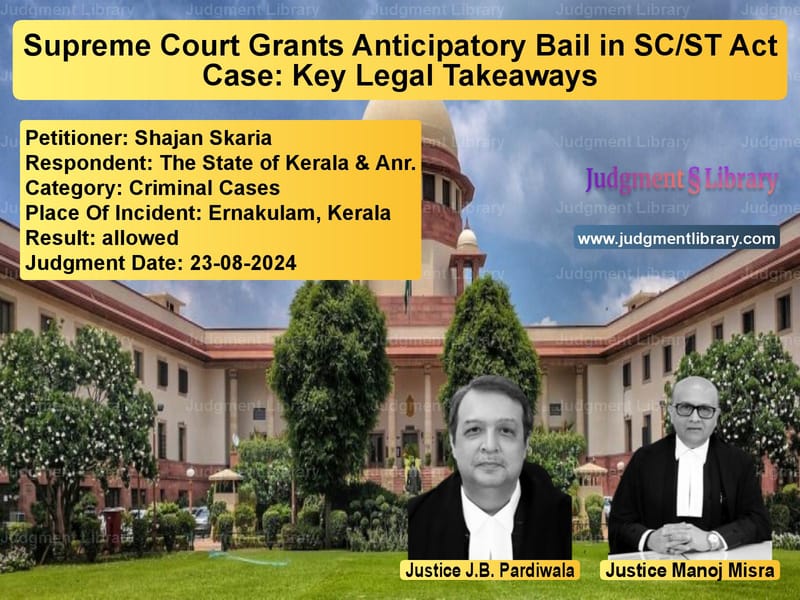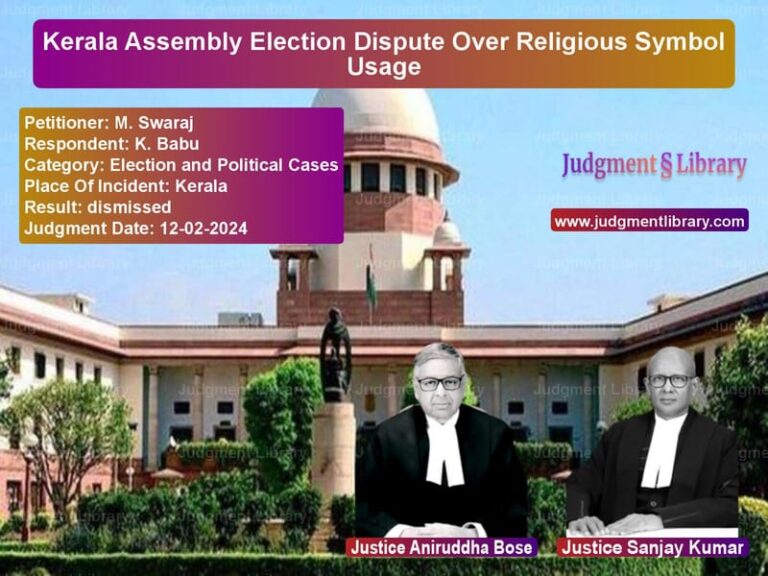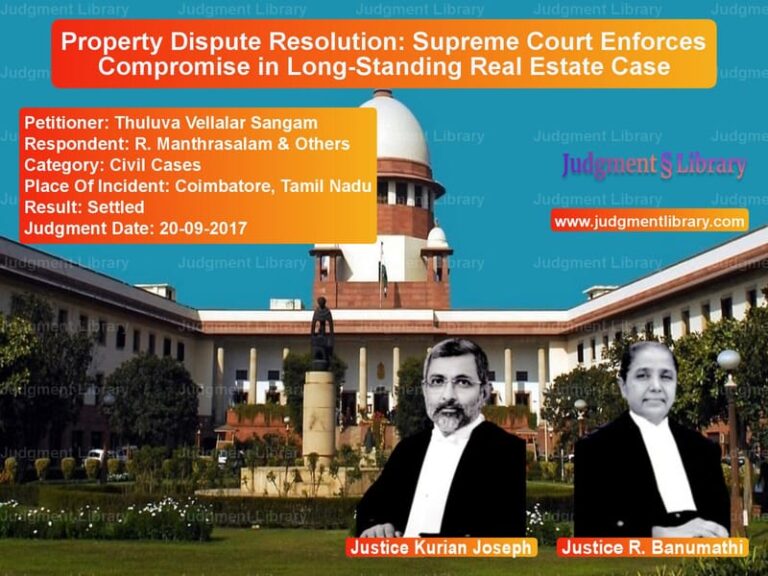Supreme Court Grants Anticipatory Bail in SC/ST Act Case: Key Legal Takeaways
The Supreme Court recently ruled in the case of Shajan Skaria vs. The State of Kerala & Anr., addressing crucial legal questions concerning the application of the Scheduled Castes and Scheduled Tribes (Prevention of Atrocities) Act, 1989 (SC/ST Act) in cases involving allegations of public insult and humiliation. The judgment extensively discussed the bar on anticipatory bail under Section 18 of the SC/ST Act, the interpretation of caste-based humiliation, and the extent of protection granted to individuals accused under the Act.
Background of the Case
The case originated from a video published on YouTube by the appellant, Shajan Skaria, the editor of an online news channel, “Marunandan Malayali.” The video made several allegations against P.V. Sreenijan, a Member of the Kerala Legislative Assembly representing a reserved constituency. The video accused the MLA of corruption, misuse of power, and involvement in illicit activities. The complainant filed a police complaint, stating that the video was intended to humiliate and insult him on account of his caste identity.
The appellant was booked under Sections 3(1)(r) and 3(1)(u) of the SC/ST Act and Section 120(o) of the Kerala Police Act. The Special Judge for SC/ST cases and later the Kerala High Court denied anticipatory bail, holding that the allegations prima facie attracted the provisions of the SC/ST Act, thereby barring pre-arrest bail under Section 18 of the Act.
Key Issues in the Case
The Supreme Court framed several legal questions for determination:
- Whether Section 18 of the SC/ST Act imposes an absolute bar on the grant of anticipatory bail?
- When can it be said that a prima facie case is made out in an FIR or complaint?
- Whether the allegations in the complaint disclosed an offence under Section 3(1)(r) and Section 3(1)(u) of the SC/ST Act?
- Whether mere knowledge of the complainant’s caste is sufficient to attract an offence under the Act?
Petitioner’s Arguments
The appellant contended that:
- The video did not mention the complainant’s caste or make any caste-based derogatory remarks.
- The allegations were general criticisms against a public figure and not an attempt to humiliate him based on his caste.
- The bar under Section 18 of the SC/ST Act should apply only in cases where a prima facie offence is made out, as per previous Supreme Court rulings.
- There was no evidence that the video was published with an intent to promote hatred against the SC/ST community.
- The allegations in the FIR were politically motivated and an attempt to silence critical journalism.
Respondent’s Arguments
The complainant and the State argued that:
- The video was intended to tarnish the complainant’s reputation, knowing that he belonged to a Scheduled Caste.
- The appellant had repeatedly targeted the complainant in a series of videos, indicating malice.
- The SC/ST Act was enacted to protect marginalized communities from public humiliation and such instances must be strictly dealt with.
- As the video was widely shared, it had the effect of lowering the complainant’s dignity in public view.
- Given the serious nature of the allegations, the appellant should not be granted anticipatory bail.
Supreme Court’s Observations
The Supreme Court made the following key observations:
- Scope of Section 18: The Court reiterated that the bar on anticipatory bail under Section 18 of the SC/ST Act applies only when the allegations prima facie establish an offence under the Act.
- Interpretation of Section 3(1)(r): The Court clarified that every insult or criticism of a person belonging to the SC/ST community does not automatically constitute an offence under the Act. The insult must be specifically directed at the individual because of their caste identity.
- Context of the Video: The Court found that while the appellant’s statements were critical of the complainant, they did not explicitly reference his caste or attempt to humiliate him for being a member of the SC community.
- No Prima Facie Case: The Court held that the FIR did not disclose a prima facie case under the SC/ST Act, as there was no direct evidence that the video was intended to insult the complainant because of his caste.
- Application of Section 3(1)(u): The Court ruled that the appellant’s statements did not amount to promoting hatred or ill-will against the SC community as a whole, which is a requirement under Section 3(1)(u).
Final Judgment
On August 23, 2024, the Supreme Court ruled:
- The appellant is granted anticipatory bail as the allegations in the FIR do not disclose a prima facie case under the SC/ST Act.
- The Kerala High Court’s order denying bail is set aside.
- The Court reiterated that while the SC/ST Act must be strictly implemented, its provisions cannot be misused for personal or political vendettas.
- The appellant must cooperate with the investigation and appear before the investigating officer when required.
Implications of the Judgment
The ruling has significant legal implications:
- Prevention of Misuse: The judgment sets a precedent against the misuse of the SC/ST Act for political or personal gains.
- Protection of Free Speech: It underscores that legitimate journalistic criticism cannot be criminalized under the SC/ST Act unless there is a direct intent to humiliate a person based on caste.
- Clarification on Anticipatory Bail: The Court reaffirmed that anticipatory bail can be granted in SC/ST Act cases where no prima facie offence is made out.
Conclusion
The Supreme Court’s ruling in this case is a landmark decision clarifying the application of the SC/ST Act in cases involving allegations of public insult. The judgment ensures that the Act is not misused while still safeguarding the rights of marginalized communities. By allowing anticipatory bail, the Court upheld the principle that criminal law must not be used as a tool for harassment, reinforcing the importance of fairness and due process in legal proceedings.
Petitioner Name: Shajan Skaria.Respondent Name: The State of Kerala & Anr..Judgment By: Justice J.B. Pardiwala, Justice Manoj Misra.Place Of Incident: Ernakulam, Kerala.Judgment Date: 23-08-2024.
Don’t miss out on the full details! Download the complete judgment in PDF format below and gain valuable insights instantly!
Download Judgment: shajan-skaria-vs-the-state-of-kerala-supreme-court-of-india-judgment-dated-23-08-2024.pdf
Directly Download Judgment: Directly download this Judgment
See all petitions in SC/ST Act Case
See all petitions in Criminal Defamation
See all petitions in Bail and Anticipatory Bail
See all petitions in Public Interest Litigation
See all petitions in Judgment by J.B. Pardiwala
See all petitions in Judgment by Manoj Misra
See all petitions in allowed
See all petitions in supreme court of India judgments August 2024
See all petitions in 2024 judgments
See all posts in Criminal Cases Category
See all allowed petitions in Criminal Cases Category
See all Dismissed petitions in Criminal Cases Category
See all partially allowed petitions in Criminal Cases Category







